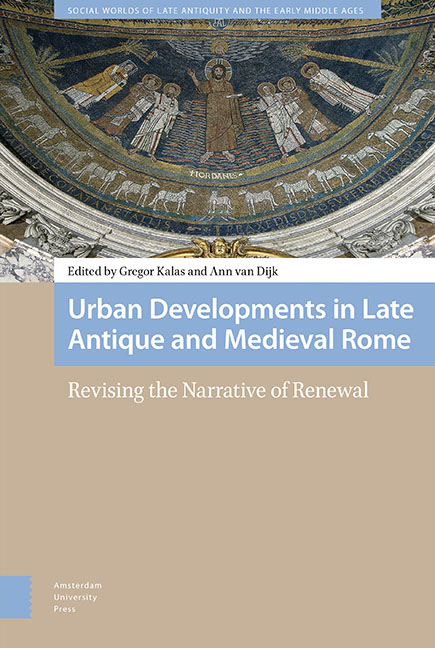Book contents
- Frontmatter
- Contents
- Preface and Acknowledgments
- List of Abbreviations
- 1 Introduction: Revising the Narrative of Renewal for Late Antique and Medieval Rome
- 2 Rome at War: The Effects of Crisis on Church and Community in Late Antiquity
- 3 Portraits of Poets and the Lecture Halls in the Forum of Trajan : Masking Cultural Tensions in Late Antique Rome
- 4 Rolling Out the Red Carpet, Roman-Style : The Arrival at Rome From Constantine to Charlemagne
- 5 (Re-)Founding Christian Rome: The Honorian Project of the Early Seventh Century
- 6 After Antiquity: Renewing the Past or Celebrating the Present? Early Medieval Apse Mosaics in Rome
- 7 The Re-Invention of Rome in the Early Middle Ages
- 8 Rewriting the Renouveau
- 9 Renewal, Heritage, and Exchange in Eleventh-Century Roman Chant Traditions
- 10 Reforming Readers, Reforming Texts: The Making of Discursive Community in Gregorian Rome
- Manuscripts Cited
- Index
1 - Introduction: Revising the Narrative of Renewal for Late Antique and Medieval Rome
Published online by Cambridge University Press: 18 June 2021
- Frontmatter
- Contents
- Preface and Acknowledgments
- List of Abbreviations
- 1 Introduction: Revising the Narrative of Renewal for Late Antique and Medieval Rome
- 2 Rome at War: The Effects of Crisis on Church and Community in Late Antiquity
- 3 Portraits of Poets and the Lecture Halls in the Forum of Trajan : Masking Cultural Tensions in Late Antique Rome
- 4 Rolling Out the Red Carpet, Roman-Style : The Arrival at Rome From Constantine to Charlemagne
- 5 (Re-)Founding Christian Rome: The Honorian Project of the Early Seventh Century
- 6 After Antiquity: Renewing the Past or Celebrating the Present? Early Medieval Apse Mosaics in Rome
- 7 The Re-Invention of Rome in the Early Middle Ages
- 8 Rewriting the Renouveau
- 9 Renewal, Heritage, and Exchange in Eleventh-Century Roman Chant Traditions
- 10 Reforming Readers, Reforming Texts: The Making of Discursive Community in Gregorian Rome
- Manuscripts Cited
- Index
Summary
This volume considers Rome during Late Antiquity and the Middle Ages by documenting continuity and innovation in the city's artistic, cultural, economic, intellectual, and ritual life. Admitting the influential legacy of antiquity, the essays presented here shift discourse away from episodes of renewal in Rome so as to shed light on cultural stability and the emergence of new trends, including the creative responses to adversity. To be sure, the past exerted a pervasive influence on medieval Rome. Despite ample evidence that urban population levels and governing institutions suffered after the fifth century CE, the political and social turmoil of these times frequently sparked innovation. Turning toward the cultural changes of post-classical and medieval Rome without categorizing them as desperate measures, this collection of essays valorizes the city's resilience.
The story of renewal hinges on the concept of decline; yet people feared Rome's decay long before Alaric's invasion in 410 CE and the city's fall that supposedly ensued. Notices of the city's dented pride appeared already during the imperial period, when authors sometimes pondered why the wounds appeared to have been self-inflicted. Tacitus, for example, distinguished between the capital's natural tragedies and those sparked by urban unrest by noting that Rome ‘was devastated by fires; the most ancient shrines were destroyed and the Capitol itself was burnt at the hands of the Roman people.’ Rome's integrity as an imperial capital, already vulnerable in the first century CE, began to be deemed as particularly threatened in the wake Alaric's sack of 410. For instance, Jerome perceived the assault on the city as a portent of the empire's demise. ‘The head of the Roman empire was hacked off, and, to speak more truly, the entire world perished together with that one city,’ wrote Jerome in a play on words that relies on the similarity between urbs (city) and orbis (world). Jerome's prediction of the end times from his commentary on the prophet Ezekiel drew upon his readings in the Apocalypse of John. As an exile in Palestine, Jerome railed against emperor Honorius's military policies in the western empire while advocating for the ascetic practices of elite women in Rome, whose virtues appeared as if a bulwark against invasions. Plausibly, Jerome sounded the apocalyptic alarm to galvanize potential supporters for his cause after the demise of his main patron, Pammachius.
- Type
- Chapter
- Information
- Urban Developments in Late Antique and Medieval RomeRevising the Narrative of Renewal, pp. 11 - 40Publisher: Amsterdam University PressPrint publication year: 2021



